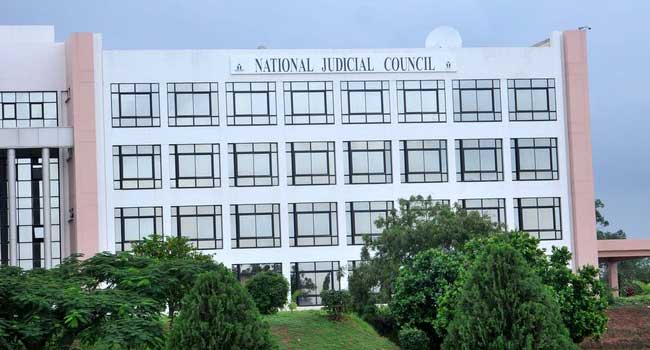The Joint Admissions and Matriculation Board (JAMB) has warned against offering of admissions to applicants by higher institutions outside the Central Admission Processing System (CAPS).
JAMB said apart from distorting the statistics of enrollment into the nation’s tertiary institutions which it noted is required for national planning and development strategies, the conduct is also “a violation of ministerial directive on education policy.”
The JAMB registrar, Is-haq Oloyede, who said this on Tuesday at a stakeholders’ forum in Abuja, the Federal Capital Territory, noted that in spite of the constant warning against such conduct, Nigerian tertiary institutions offered a total of 706,189 ‘illegal’ admissions across universities, polytechnics, colleges of education and monotechnics between 2017 and 2020.
According to Mr Oloyede, a total of 114 degree-awarding institutions including universities and colleges of education that are affiliated with them conducted 67,795 ‘illegal’ admissions within the period.
He added that a total of 137 National Diploma (ND) certificates awarding institutions such as polytechnics and school of health technologies offered a total of 142,818 ‘illegal’ admissions within the three-year period, while 37 institutions that are categorised as monotechnics offered 5,678 ‘illegal’ admissions.
The JAMB registrar said; “In 2017, the Board introduced the Central Admissions Processing System (CAPS) as a flowchart to ensure quality control, transparency and credibility of admissions. Among other reasons, it was also meant to completely eliminate human interference, which invariably led to abuse, in the processing of admissions into the nation’s tertiary institutions. The system allows institutions to only admit candidates that meet the requirements as prescribed by individual institutional proprietors and academic Boards/ Senates. The process entails: initiation of the admission of a candidate by the institutional admissions officer after having confirmed the satisfaction of the set criteria; recommendation of the candidate by the head of the institution; approval of the admission by JAMB; acceptance of the admission by the candidate; and printing of the admission letter by the candidate.
“All these are done without hassles or encumbrances. Any process outside this scheme is illegitimate and it renders the admission process null, void and ultra vires. It is rather disappointing that some institutions continue to defy this decision of the National Policy Meeting, ably chaired by the Honourable Minister of Education, that CAPS is the only platform for processing admissions to the tertiary institutions in Nigeria.”
printing of the admission letter by the candidate.
“All these are done without hassles or encumbrances. Any process outside this scheme is illegitimate and it renders the admission process null, void and ultra vires. It is rather disappointing that some institutions continue to defy this decision of the National Policy Meeting, ably chaired by the Honourable Minister of Education, that CAPS is the only platform for processing admissions to the tertiary institutions in Nigeria.”
‘
According Mr Oloyede’s presentation, the top five universities with the highest number of ‘illegal’ admissions offered within the period are the Universities of Jos, Plateau State with 7,600 cases; Benue State University, Makurdi with 6,161 cases; Olabisi Onabanjo University (OOU), Ago Iwoye, Ogun State, with 5,669 cases; Kwara State University, Malete with 4,281 cases and Novena University, Delta State with 3,432 cases.
Among the ND certificate awarding institutions, the Kwara State Polytechnic, Ilorin, topped the chart with a total of 45,471 cases within three years, and it is closely followed by Auchi Polytechnic, Edo State, with 37,828 cases and Yaba College of Technology, Lagos, with 30,856 cases within the same period.
ⓘ
Others are the Federal Polytechnic, Oko, Anambra State and the Federal Polytechnic, Nasarawa, Nasarawa State with 24,335 and 24,335 respectively.
The indicted institutions are yet to react to the allegations.
Mr Oloyede said apart from distorting the national statistics, candidates admitted through the irregular admission processes are made to go through difficult times in their efforts to climb the next rung of either their career or academic ladders.
“Sadly, this practice by our institutions has damaged the image of the country as statistics provided by the National Bureau of Statistics (NBS) and similar agencies are rendered inaccurate by as high as 900 per cent in some cases. This distorts the statistics of the number of students in our tertiary institutions. JAMB is then made to supply radically different figures of entrants for the same year. In addition, misplaced pressure is annually mounted on JAMB to condone (or regularise) such illegal and improper admissions made three or four years earlier by the heads of institutions who in almost all the cases are not the incumbent ones.
“Another absurdity is that the Gross Enrolment Ratio (GER) for tertiary education which JAMB provides for the Federal Ministry of Education is fed into the global databank of tertiary institutions and Nigeria continues to publish a low GER record which is far from the reality on ground. Also, one of the unsavoury effects of the undisclosed admissions by tertiary institutions is that it makes planning difficult. As we all know, failure to plan is planning to fail and we cannot overemphasise the importance of proper planning.”
According to Mr Oloyede, beneficiaries of such ‘illegal’ admissions upon graduation are made “victims of deprivations.”
“When the graduates of the illegitimate process need JAMB admission letters to pursue post-graduation endeavours like housemanship, scholarship, enrolment into the National Youth Service Corps (NYSC), among others, they realise that they are out of sync. Some candidates had been forced in the past to seek Direct Entry into other universities after graduation just because their degrees were not recognised as a result of lack of admission letters at critical stages. The physical, psychological and mental strain on such candidates is better imagined than experienced. This could have been avoided if everyone played the game according to the rules,” Mr Oloyede added.
This could have been avoided if everyone played the game according to the rules,” Mr Oloyede added.
A-Level exam malpractices
The JAMB registrar also expressed disappointment over what he described as massive fraud in the conduct of the two A Level entrance examinations in the country- Joint Universities Preliminary Examinations Board (JUPEB) and the Interim Joint Matriculation Board Examination (IJMBE).
“It is quite disappointing that some of our colleagues were arrested while conniving with various examination syndicates to compromise the noble objectives of these two examinations. The Independent Corrupt Practices and Other Related Offences Commission (ICPC) in conjunction with the Federal Ministry of Education (FME) conducted a sting operation the result of which is monumentally embarrassing,” he said.
Education Minister Mallam Adamu Adamu says institutions violating admission process will be sanctioned
As a way of finding a lasting solution to the challenge, JAMB said it has already proposed to the education minister, Adamu Adamu, the desire to establish both A-Level task team and A-Level Qualification Verification Databank, which he noted will serve as repository for verified A-level qualifications in the country.
Meanwhile, the examination body said it has approved the introduction of two more subjects in its examination to be added to the existing 23 subjects for possible combinations by candidates.
The addition of the two subjects- Computer Studies and Physical and Health Education, will “enhance the career prospects of students transiting to tertiary institutions.”
Mr Oloyede said the subjects will be available for candidates taking the UTME examination in 2022.
JAMB said as part of efforts towards curbing some identified “unethical practices” by operators of the accredited computer based testing (CBT) centres, it has resolved to embed the centres’ approved N700 charges for registration purposes in its application form fees.
“These centres are allowed to collect only Seven Hundred Naira (N700.00) as registration charges but they use the opportunity to engage in conduct unbecoming, including extortion, during the exercise. In order to put a stop to such extortion, we propose to make UTME registration henceforth cashless. In other words, JAMB will now be collecting the approved N700.00 registration fee on behalf of the CBT Centres along with its UTME registration fees and then remit what is due to each registration centre to its bank account on a weekly basis or any time frame acceptable to the centre owners. This intervention will block all loopholes through which hapless candidates are extorted by unscrupulous service providers,” the JAMB registrar said.





